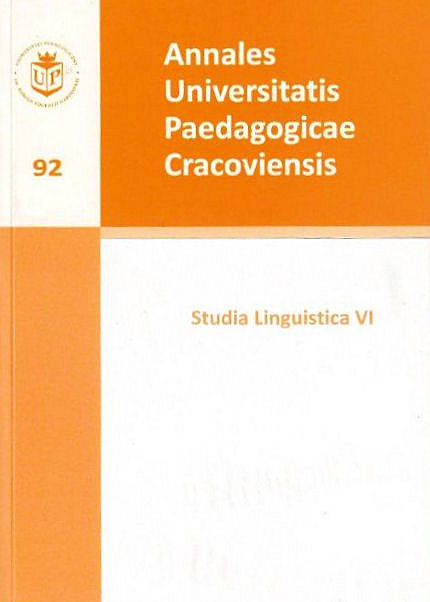Od kiedy szewc bez butów chodzi? – tradycyjne zawody rzemieślnicze w polskiej frazeologii i paremiologii
Main Article Content
Abstract
The comparison of old and contemporary idioms which contain lexemes szewc or szewski [cobbler, cobbler’s] demonstates the essential traits in the development of Polish phraselogy connected with crafts and craftsmanship. Their analysis shows that many idioms disappear as the picture of professional activities they convey is deemed too simplistic. On the other hand, the linguistc history of the proverb szewc bez butów chodzi illustrates the most characteristic features of craft-related idiomatic language (i.e. variants based on the similar depictions of craft works, interchangeability of trades, internationalism).
Downloads
Article Details
Author, submitting a text to the editorial board of the journal “Annales Universitatis Paedagogicae Cracoviensis. Studia Linguistica", certifies that the content of the article has not been published so far and that the work does not violate in any way the copyright or related rights of other person, as well as other rights of third parties, and that no one's rights to the work (or any part thereof) have been missed. After signing the contract, the property rights to the published materials are transferred to the Scientific Publisher of the University of the National Education Commission, Krakow.
“Annales Universitatis Paedagogicae Cracoviensis. Studia Linguistica” is an open access journal, and all its content is made available free of charge to users and institutions under the Creative Commons CC-BY-NC-ND 4.0 license (attribution, non-commercial use, no derivative works). Under this license, the authors agree that their work may be lawfully reused for any purpose, except for commercial purposes, without the prior consent of the author or publisher. Everyone can read, download, copy, print, distribute and process these works, provided that the author's marking and the original publication place are correct. Published texts may not be used to create derivative works (e.g. to translate and publish in another language without the consent of the publisher). This is in line with the BOAI (Budapest Open Access Initiative) definition. "Studia Linguistica" does not charge for submitting or processing articles.

